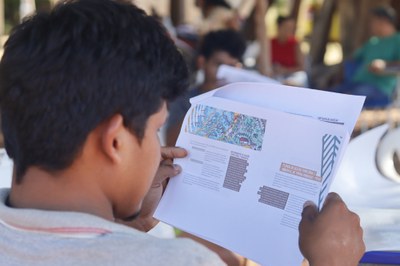Indigenous Firefighters: Contributing to Environmental Management
July, 2024 – Recanto dos Cocais, a village in the state of Maranhão, hosted an event to discuss different ways to monitor the land and how the work of firefighters may contribute to the implementation of management policies.
About 30 Indigenous firefighters, including women, shared their experiences with the aim of implementing initiatives under the National Policy for Territorial and Environmental Management of Indigenous Lands (PNGATI). PNGATI is a policy that aims to guarantee and promote the protection, recovery, conservation, and sustainable use of natural resources in Indigenous lands and territories, respecting each people’s sociocultural autonomy.
In addition to the Indigenous firefighters, around 60 people attended the seminar promoted by the Wewetyj Community Association. The event was supported by USAID under a project named Contributions of the Krikati Federal Indigenous Brigade to the Environmental Recovery of the Pindaré Headwaters, developed in partnership with the United States Forest Service (USFS) and the National Foundation of Indigenous Peoples (FUNAI). The project promotes the reforestation of the area near the Pindaré headwaters, in the Krikati Indigenous Land. Rivers are used by local communities for fishing and as a source of water for food production (read more).
Celiana Krikati, head of the Krikati Federal Indigenous Brigade, and Samara Alves Guajajara, from the Canudal Brigade, are two of the three women firefighters from Maranhão who attended the event to share their work experiences and inspire others to join the initiative. “I had always wanted to work in the fire brigade, and, in 2022, I had the honor of joining the Canudal team. We are here this year, and I will do my best to continue representing [women],” said Samara.
In the state of Maranhão, there are 17 Indigenous territories in the Amazon and Cerrado biomes and eight Indigenous fire brigades. From July to October the firefighters participate more intensely in fire prevention and firefighting work, since these are the months with the highest incidence of fire outbreaks in Maranhão.
In the other months, they engage in environmental, educational, and recovery actions for degraded areas. “Above all, it is important to say that these fire brigades are one of the pillars for the National Policy for Territorial and Environmental Management of Indigenous Lands, since they are present in practically all actions related to territorial management. We highlight the importance of preventing and fighting forest fires; but, when these brigades are not working on that, they are promoting environmental education. This is key for the implementation of the policy," said Emerson Rubens, from the National Secretariat of Environmental and Territorial Management at the Ministry for Indigenous Peoples.




